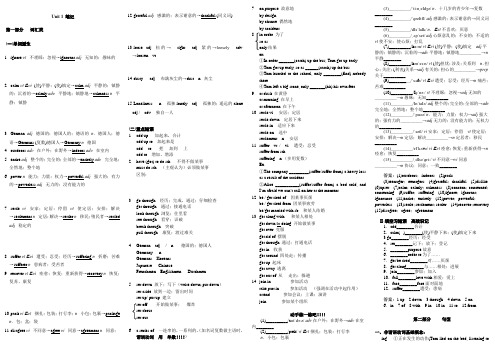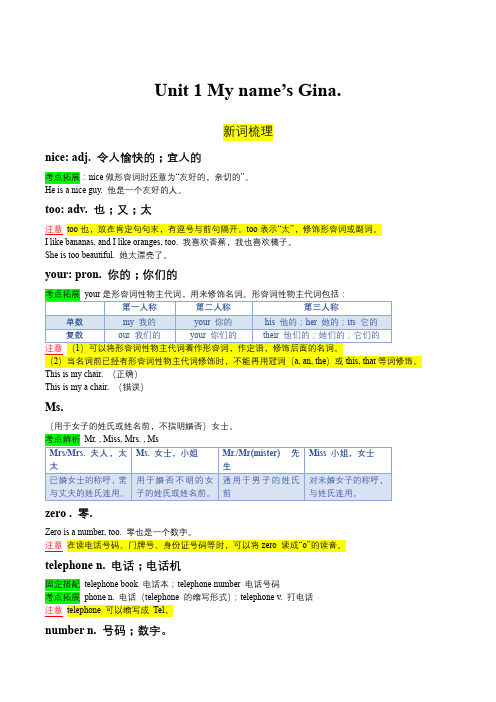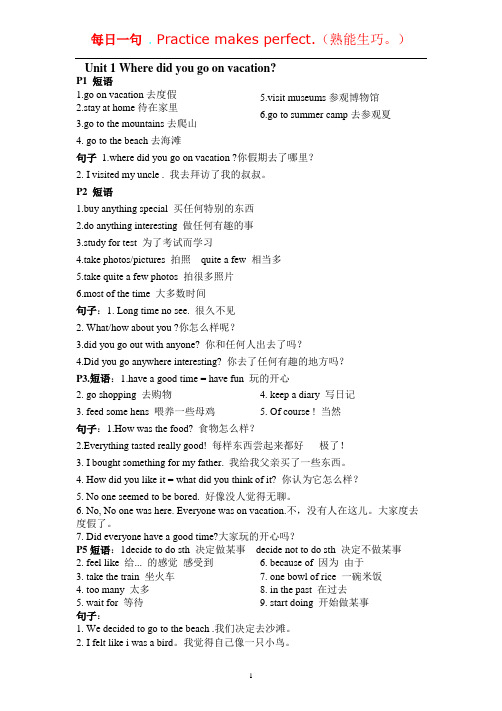Unit1知识点整理
高中英语必修一 unit 1知识点笔记及练习

Unit 1 笔记第一部分词汇类(一)单词派生1.ignore v t. 不理睬;忽视→ignorant adj. 无知的;愚昧的2.calm v t.&v i. (使)平静;(使)镇定→calm adj. 平静的;镇静的;沉着的→calmly ad v. 平静地;镇静地→calmness n. 平静;镇静3.German adj. 德国的;德国人的;德语的n.德国人;德语→Germans (复数)德国人→Germany n. 德国4.outdoors ad v. 在户外;在野外→indoors ad v. 在室内5.entire adj. 整个的;完全的;全部的→entirely ad v. 完全地;全然地;整个地6.power n. 能力;力量;权力→powerful adj. 强大的;有力的→powerless adj. 无力的;没有能力的7.settle v i. 安家;定居;停留v t. 使定居;安排;解决→settlement n. 定居;解决→settler n. 移民;殖民者→settled adj. 稳定的8.suffer v t.&v i. 遭受;忍受;经历→suffering n. 折磨;苦难→sufferer n. 患病者;受苦者9.recover v t.&v i. 痊愈;恢复;重新获得→recovery n. 恢复;复苏,康复10.pack v i.&v t. 捆扎;包装;打行李;n. 小包;包裹→packagen.包;盒;袋11.disagree v i. 不同意→agree v i. 同意→agreement n. 同意;12.grateful adj. 感激的;表示谢意的→thankful (同义词)13.loose adj. 松的→tight adj. 紧的→loosely adv.→loosen vt.14.dusty adj. 布满灰尘的→dust n. 灰尘15.Loneliness n. 孤独lonely adj. 孤独的;遥远的aloneadj./ adv. 独自一人(二)重点短语1.add up 加起来,合计add up to 加起来是add.... to... 把.....加到.....上add to 增加,增添2.have (got) to do sth 不得不做某事must do sth (主观认为)必须做某事区别:3.go through 经历;完成,通过;仔细检查get through 通过;接通电话look through 浏览;往里看see through 看穿;识破break through 突破pull through 康复;渡过难关4.German adj. / n. 德国的;德国人Germany n.Germans KoreansJapanese ChineseFrenchmen Englishmen Dutchmen5.set down 放下;写下(write down; put down)set aside 放到一边;留出时间set up/ put up 建立set off 开始做某事;爆炸set aboutset out6. a series of 一连串的,一系列的。
Unit 1 知识点梳理

Unit 1 My name’s Gina.新词梳理nice: adj. 令人愉快的;宜人的考点拓展:nice做形容词时还意为“友好的,亲切的”。
He is a nice guy. 他是一个友好的人。
too: adv. 也;又;太注意too也,放在肯定句句末,有逗号与前句隔开。
too表示“太”,修饰形容词或副词。
I like bananas, and I like oranges, too. 我喜欢香蕉,我也喜欢橘子。
She is too beautiful. 她太漂亮了。
your: pron. 你的;你们的This is my chair. (正确)This is my a chair. (错误)Ms.(用于女子的姓氏或姓名前,不指明婚否)女士。
zero . 零.Zero is a number, too. 零也是一个数字。
注意在读电话号码、门牌号、身份证号码等时,可以将zero 读成“o”的读音。
telephone n. 电话;电话机固定搭配telephone book 电话本;telephone number 电话号码考点拓展phone n. 电话(telephone 的缩写形式);telephone v. 打电话注意telephone 可以缩写成Tel。
number n. 号码;数字。
注意number 用于数字前可以被缩写为No. ,其后应用阿拉伯数字。
first adj. 第一。
Sunday is the first day of a week. 星期天是一周的第一天。
考点拓展(1)first 的反义词:last adj. 最后的;末尾的(2)first 还可以做副词,意为“首先”You must finish your homework first. 你必须先完成你的家庭作业。
last adj. 最后的;末尾的固定搭配last name 姓;at last 终于;最后考点拓展(1)last还可以用作副词,意为“最后;上次”He came last in the race. 赛跑中她是最后一个到达的。
英语必修一unit1单词知识点

Unit one1、Add up 合计,把......加起来Add up all the money i owe you.Add ... to...把...加入...Will you add more sugar to your coffee?Add to 增加,添加The piece of music adds to our enjoyment.Add up to总计为,结果是Little steps add up to big dreams.2、upset ----upset ----upsetI am sorry if i have upset you.adj: be upset about 为......烦恼,不安Try not to be too upset about it.3、calm(...)down使平静下来,使镇定下来Calm yourself down ; there is no need to feel upset about it. The excited football fans calmed down at last.4、be concerned about 关心,挂念He is concerned about his son`s future.Concern vt 使担忧;涉及n 担心,关系Concerning 介词关于使担忧Her illness concerns her parents.涉及The story concerns a friend of mine.n They showed great concern about her safety.As far as i am concerned 就我而言5、go through 经历,经受;仔细检查;完成,做成get through 接通电话6、set down记下;放下;登记I set down everything that happened then.set about doing sthset out to do sthset aside 不顾;把......置于一边set off 动身;出发;使爆炸set up 创建,开办7、a series of 一系列的series 单复数同行8、on purpose 故意She did it on purpose.9、in order to 为了In order to see it clearly, he put on his glasses.so as to 不放在句首10、settle down 定居;安定下来settle 定居;解决settler 定居者settlement定居11、suffer 之后接抽象名词(loss, pain)suffer from 后接具体的疾病名词等。
Unit 1 知识点归纳

Unit 1 Where did you go on vacation? P1 短语1.go on vacation去度假2.stay at home待在家里3.go to the mountains去爬山4. go to the beach去海滩5.visit museums 参观博物馆6.go to summer camp去参观夏句子 1.where did you go on vacation ?你假期去了哪里?2. I visited my uncle . 我去拜访了我的叔叔。
P2 短语1.buy anything special 买任何特别的东西2.do anything interesting 做任何有趣的事3.study for test 为了考试而学习4.take photos/pictures 拍照quite a few 相当多5.take quite a few photos 拍很多照片6.most of the time 大多数时间句子:1. Long time no see. 很久不见2. What/how about you ?你怎么样呢?3.did you go out with anyone? 你和任何人出去了吗?4.Did you go anywhere interesting? 你去了任何有趣的地方吗?P3.短语:1.have a good time = have fun 玩的开心2. go shopping 去购物3. feed some hens 喂养一些母鸡4. keep a diary 写日记5. Of course ! 当然句子:1.How was the food? 食物怎么样?2.Everything tasted really good! 每样东西尝起来都好极了!3. I bought something for my father. 我给我父亲买了一些东西。
高一上册英语Unit1知识点

高一上册英语Unit1知识点1. 单词1.1. Unit 1中的重要单词有:classmate, greet, introduce, surname, first name, age, address, nationality, pen pal, foreign, country, capital, language, population, culture, continent, Europe, Asia, Africa, North America, South America, Australia2. 词组2.1. Unit 1中的常用词组有:be from, meet...for the first time, Nice to meet you., How do you do?, thanks for, No problem., a little, in front of, next to, across from, speak English, come from, say hello to, have a good time, of course, be interested in, ask...about, find out, make friends, send...to3. 重要语法3.1. Be动词的用法:am, is, are- 3.1.1. 用于对人称和名词进行表述- 3.1.2. 有肯定、否定和疑问形式3.2. 人称代词的主格和宾格:I, you, he, she, it, we, they, me, him, her, us, them- 3.2.1. 用于主语和宾语位置3.3. 句型结构:- 3.3.1. What's your surname? My surname is...- 3.3.2. What's your first name? My first name is...- 3.3.3. How old are you? I'm...- 3.3.4. Where are you from? I'm from...- 3.3.5. Nice to meet you.- 3.3.6. How do you spell your surname/first name?- 3.3.7. What's your nationality? I'm...- 3.3.8. What languages do you speak?3.4. 形容词的比较级和最高级形式- 3.4.1. 根据单音节形容词、双音节形容词和部分特殊形容词的变化规则进行对比- 3.4.2. 用于描述人或事物的物理特征或性质3.5. 名词所有格的用法- 3.5.1. 对单数和复数名词添加“'s”表示所有关系- 3.5.2. 对以s结尾的复数名词添加“'”表示所有关系3.6. 特殊疑问词的用法- 3.6.1. 用于提问特定信息,如人称、名字、地点等4. 句型练习4.1. 在日常生活中,用英语进行自我介绍的句型:- 4.1.1. Hello, my name is [姓名]. I'm [年龄] years old. I'm from [地点]. I'm [国籍]. I speak [语言].4.2. 询问他人信息的句型:- 4.2.1. What's your surname? / What's your first name?- 4.2.2. How old are you?- 4.2.3. Where are you from?- 4.2.4. What's your nationality?- 4.2.5. What languages do you speak?- 4.2.6. How do you spell your surname/first name?4.3. 邀请和应答句型:- 4.3.1. Would you like to...?- 4.3.2. Yes, sure. / No, thanks. / Sorry, I can't.4.4. 描述人或事物的句型:- 4.4.1. He/She is... / It is...- 4.4.2. He/She is [形容词比较级] than...- 4.4.3. He/She is the [形容词最高级]...4.5. 请求帮助和应答句型:- 4.5.1. Can you help me with...?- 4.5.2. Sure, no problem. / Sorry, I can't.5. 文化知识5.1. 欧洲、亚洲、非洲、北美洲、南美洲和澳洲是世界上的六大洲,并介绍了每个洲的主要国家和首都。
高一英语必修一unit1知识点

高一英语必修一unit1知识点(经典版)编制人:__________________审核人:__________________审批人:__________________编制单位:__________________编制时间:____年____月____日序言下载提示:该文档是本店铺精心编制而成的,希望大家下载后,能够帮助大家解决实际问题。
文档下载后可定制修改,请根据实际需要进行调整和使用,谢谢!并且,本店铺为大家提供各种类型的经典范文,如演讲稿、总结报告、合同协议、方案大全、工作计划、学习计划、条据书信、致辞讲话、教学资料、作文大全、其他范文等等,想了解不同范文格式和写法,敬请关注!Download tips: This document is carefully compiled by this editor. I hope that after you download it, it can help you solve practical problems. The document can be customized and modified after downloading, please adjust and use it according to actual needs, thank you!In addition, this shop provides you with various types of classic sample essays, such as speech drafts, summary reports, contract agreements, project plans, work plans, study plans, letter letters, speeches, teaching materials, essays, other sample essays, etc. Want to know the format and writing of different sample essays, so stay tuned!高一英语必修一unit1知识点知识是外在的照明,智慧是内在的照明。
unit1知识点
unit1知识点
以下是Unit 1的知识点:
1. 问候和自我介绍:
- 问候的常用表达:Hello, hi, good morning/afternoon/evening, how are you?
- 自我介绍的常用句型:My name is xxx. I am xx years old. I come from xxx.
2. 介绍家庭成员:
- 家庭成员的称呼:father, mother, brother, sister, grandparents, etc.
- 介绍家庭成员的常用句型:This is my father/mother/brother/sister. His/Her name is xxx.
3. 询问和回答个人信息:
- 询问名字:What's your name?/What's your full name?
- 询问年龄:How old are you?
- 询问国籍:Where are you from?
- 回答个人信息的常用句型:My name is xxx. I am xx years old. I come from xxx.
4. 简单的日常用语:
- 感谢:Thank you. Thanks a lot.
- 道歉:I'm sorry. I apologize.
- 请问:Excuse me, can I ask you a question?
5. 时态:
- 一般现在时:表述经常发生的事情、事实和真理。
- 现在进行时:表示现在正在进行或发生的动作。
这些是Unit 1的主要知识点,希望对你有帮助!。
必修一Unit1知识点汇总
必修一Unit 1Friendship一.重点单词:1.upset adj.心烦意乱的;不安的;不适的vt.使不安;使心烦(upset; upset) 2.ignore vt.不理睬;忽视→ignorance n.愚昧→ignorant adj.无知的;粗鲁的3.calm vt. & vi.(使)平静;(使)镇定adj.平静的;镇静的;沉着的4.concern vt. & n.(使)担忧;涉及;关系到;担心;关注;(利害)关系→concerned adj.担忧的→concerning prep.关于5.loose adj.松的;松开的→tight紧的6.series n.连续;系列7.outdoors adv.在户外;在野外8.entire adj.整个的;完全的;全部的9.power n.能力;力量;权力→powerful adj.有权势的10.settle vi.安家;定居;停留vt.使安居;安排;解决→settled adj.→settlement n.安居;定居11.suffer vt. &vt.遭受;忍受;经历→suffering n.痛苦;折磨12.recover vi. &vt.痊愈;恢复;重新获得→recovery n.痊愈13.pack vi. &vt.捆扎;包装;打行李n.小包;包裹14.exactly adv.确实如此;正是;确切地→exact adj.精确的15.disagree vi.不同意→disagreement n.→agree 反义词二.重点词组:1.add up合计2.calm down 平静下来;镇定下来3.have got to 不得不,必须4.be concerned about 关心,挂念5.go through 经历;经受6.set down 放下;记下;登记7.a series of 一连串的;一系列的8.on purpose 故意9.in order to 为了……10.at dusk 在黄昏时刻11.face to face 面对面12.no longer/not any longer 不再13.suffer from 遭受;患病14.get/be tired of 对……厌烦15.pack (sth.) up 将(东西)装箱打包16.get along with 与……相处;进展17.fall in love 相爱;爱上18.join in 参加;加入三.拓展提升:1.upset adj. 心烦意乱的;不安的,不适的vt. 使不安;使心烦,打乱(upset; upset)be upset about 对……感到心烦It upsets sb. that 让某人心烦的是……It upsets sb. to do sth. 做……使某人不快upset the plan 搅乱了计划(1)I ______ ______ ______ the bad news.我对那则坏消息感到心烦意乱。
Unit1重要知识点
1、书上、报纸上、杂志上写着It says / the book says2、make sb feel good =make sb goodmake sb do sthmake +n+adj3、eat ate eateneat up sth = eat sth up代词放中间例:eat them up4、patient 反义词impatient (adj.)patient (n.) 病人do operations on patients 5、It’s +adj (不表示性格) for sb to do sth例:It’s important / necessary for sb to do sth It’s + adj (表示性格)of sb to do sth例:It’s patient /wrong /right of sb to do sth 6、It’s +adj +enough to do sth= It’s + adj of sb to do sth7、询问对某人/某物的看法,回答用形容词What do you think of sth/sb?How do you find/like sth/sb?8、询问职业What are you?What’s your job?What do you do ?9、询问长相What are you like ?What do you look like?10、询问性格What are you like ?Keys of reading1、be bornTom was born on a snowy dayon May 4thin Junein Nanjinga born artistan artist2、His work shouts . 作品极具说服力。
Work ①工作(n.) 不可数名词too much work②作品(可数名词)a work of artHis works shout .③工人worker④work to high standardsWork for sb /sthWork with numbers/sb3、Shout 例句:The work shouts. 说服力Shout at sb 对某人大喊大叫4、Impress sb with sth5、Win high praise from the art communityWin won6、Share the best art with people= Shart with people the best art7、Be always doing sth8、Search for sth better/differentSearch for sth on the Internet9、In itself is great fun.反身代词The story itself is very interesting.The music itself is wonderful.10、give up doing sthgive gave given11、The general manager of the company.The general meaning of the article.12、Life is like a race .You either take the lead or fall behind.13、be ready to do sthbe willing to do sth14、take on new challenges15、the chief engineer of the high-speed railway16、connect sth to sba railway connecting sth to stha boy standing therea wallet lying on the ground (Ving 表示主动,修饰n.)a boy called Tom / a book written by sb (过去分词表示被动)17、 a miss is a s good as a mile.18、afford to do sthwe can’t afford to make any mistakes.I’m poor . I can’t afford to buy the computer.19、pay attention to sthpay attention to doing sth例:we should pay attention to listening to the teachers in class.20、Serious ①认真的②严肃的,严重的I’m serious.There’s nothing serious.Seriously (adv.)严重地I’m seriously/badly/terribly ill.21、one of his team members is…22、be + adj to do sthHe’s easy to work with .It’s necessary ( for sb ) to do sth.23、the head of the hospital24、 a pioneer heart surgeon25、as a doctor ,you can’t be too careful.26、Carelessness will be a disaster not only to ourselves but also to patients.27、do extra workwork extra hours28、devote sth to sthdevote sth to doing sth29、be an excellent teachermake an excellent teacher。
高一英语必修一unit1知识点
高一英语必修一unit1知识点高中英语必修一Unit 1 知识点梳理一、词汇与短语1. 形容词与副词- 形容词用于描述名词的特征或属性,如:beautiful, interesting, difficult。
- 副词用来修饰动词、形容词或其他副词,表达方式、程度、时间等,如:quickly, usually, very。
2. 常用短语- as soon as possible:尽快地- as…as:和…一样- take place:发生- in order to:为了- be full of:充满- be strict with:对…严格- look forward to:期待二、语法点1. 比较级和最高级- 形容词和副词的比较级和最高级的构成规则,以及它们的基本用法。
- 比较级用于比较两者,最高级用于比较三者以上。
2. 现在完成时- 现在完成时的构成:助动词have/has + 过去分词。
- 现在完成时表示过去发生的动作对现在造成的影响或结果,或者从过去开始一直持续到现在的动作。
3. 一般现在时- 一般现在时的构成:主语 + 动词原形/第三人称单数形式。
- 一般现在时用于描述经常发生的动作、习惯、事实或状态。
三、阅读理解技巧1. 快速浏览(Skimming)- 快速浏览文章,抓住文章的主旨大意。
- 通过标题、图片、段落首句和尾句等信息进行判断。
2. 寻找主题句- 主题句通常位于段落的开头,概括了该段落的主要内容。
- 通过主题句可以更好地理解段落的核心思想。
3. 推理判断- 根据上下文线索,推断生词或难句的意思。
- 通过逻辑关系和文章结构进行推理。
四、写作技巧1. 开头引入- 使用引人入胜的开头,如引用名言、提出问题或描述一个场景。
- 开头应简洁明了,直接引入文章主题。
2. 正文论述- 按照逻辑顺序组织文章,每个段落只讨论一个中心点。
- 使用恰当的连接词,使文章结构清晰,逻辑性强。
3. 结尾总结- 总结文章的主要观点,重申文章的中心思想。
- 1、下载文档前请自行甄别文档内容的完整性,平台不提供额外的编辑、内容补充、找答案等附加服务。
- 2、"仅部分预览"的文档,不可在线预览部分如存在完整性等问题,可反馈申请退款(可完整预览的文档不适用该条件!)。
- 3、如文档侵犯您的权益,请联系客服反馈,我们会尽快为您处理(人工客服工作时间:9:00-18:30)。
Vocabulary1.flame◎n. The whole building was soon in flames. burst into flames※literary a sudden strong feelinga flame of passion anger desire hope◎v. literary to become suddenly bright with light or colour, especially red or orange: Erica’s cheeks fla med (with anger.)sh---lace◎something firmly to something else,or to tie two things together firmly using a ropeAfter lashing the boat to the bank, we ran for shelter from the storm.◎to hit/attack sth. with violent forceThe man lashed the horse to go faster.Giant waves /wind/rain/sea lashed the sea wall.◎if an animal lashes its tail, or if its tail lashes, it moves its tail fast and violently from side to side, often when it is angry◎to criticize someone angrily –used especially in newspapers: Democrats lashed Republican plans, calling them extreme.Gallins lashed back at those who accused him of corruption.※Olson lashed out at the media.(critcize sb. suddenly)She would suddenly lash out at other children.( to suddenly try to hit sb)n. (作为惩罚的)鞭打,抽打:They each received 20 lashes for stealing.*eye‧brow /ˈaɪbraʊ/眉毛lash/eyelash睫毛3.scoff◎If you scoff at something, you laugh at it in a way that shows you think it is ridiculous David scoffed at her fears.Officials scoffed at the idea.‘You, a scientist!’ he scoffed.It’s easy to scoff when you haven’t tried it yourself.4.sway◎to move slowly from one side to another:The trees swayed gently in the breeze.※to influence someone so that they change their opinion:Don’t allow yourself t o be swayed by his promises.5.illusion◎a false or wrong belief or idea错误的观念;幻想illusion that: Many people still have the illusion that full employment is possible. create/give/maintain the illusion: This description creates the illusion that we can solve all our environmental problemsbe under no illusion/illusions (=not have a false idea): We are under no illusion that this money will be enough.have no illusions (=realize that something is difficult or unpleasant): I had no illusions about the task that lay ahead.◎an appearance or effect that is different from the way that things really areGlass bricks in the bathroom gave the illusion of lightness and space.For some time, Yeltsin’s rule provided an illusion of stability.c.f. a false belief about yourself or the situation you are inunder a delusion (that)错觉He is under the delusion that I am going to cheat him.6.steady◎CONTINUOUS continuing or developing gradually or without stopping, and not likely to change:Paul is making steady progress.a steady rainIt’s hard to find a steady, well-paying job.◎NOT MOVING firmly held in a particular position ⇨stable◎sb. is reliable /sensible理智的,可靠的He was firm and steady unlike other men she knew.There were tears in her eyes, but her voice was steady.He could not me et Connor’s steady gaze.7.de'va'stating◎badly damaging something(比damaging程度更深)Acid rain has a devastating effect/impact on the forest.It will be a devastating blow/result/consequence for the town if the factory closes.◎(因破坏力之强而,贬) making someone feel extremely sad or shocked/impressive:It is devastating to be diagnosed with a terminal illness.The party suffered a devastating defeat in the local election.◎(强调威力之大,褒)impressive and powerfulhis devastating performance in the 100 metres Her smile was devastating.8.rumble(deep sound)◎v.to make a continuous deep sound Thunder rumbled in the distance.We could hear thunder rumbling in the distance.※to move forwards making a continuous deep soundLorries rumble past their homes.※if a disagreement rumbles on, it continues for a long timeDiscussions rumble on over the siting/location of the new airport.◎n. a series of long low soundsI heard a rumble of thunder. | the low rumble of a train approaching◎v.if your stomach rumbles, it makes noises because you are hungryI'm so hungry my stomach's rumbling.◎v.(BrE, informal) to discover the truth about sb or what they are trying to hide穿帮They knew they had been rumbled.9.careen◎mainly AM 主美To careen somewhere means to rush forward in an uncontrollable way.The bus careened off the road and plunged into a river.※to be in a situation that changes quickly in an uncontrolled wayThe country has careened from one crisis to another.an economic system careening towardscollapse10. purgatory◎Purgatory in Roman Catholic belief, a place where the souls of dead people suffer until they are pure enough to enter heaven※[uncountable] something that makes you suffer – used humorously:Sewing is relaxation for some, purgatory for others.11.ultimate(extreme in some aspects)adj./n. ◎(end)You use ultimate to describe the final result or aim of a long series of events.He said it is still not possible to predict the ultimate outcomeour ultimate goal / aim / objective / target The ultimate decision lies with the parents.◎(basic)You use ultimate to describe the original/basic source or cause of something. Plants are the ultimate source of all foodstuffs...The ultimate cause of what's happened seems to have been the advertising campaign.◎(important)You use ultimate to describe the most important or powerful thing of a particular kind.the ultimate power of the central government My experience as player, coach and manager has prepared me for this ultimate challenge. ◎(worst)Treachery was the ultimate guilt◎n. the ultimate in something is the best or most modern example of something:The plane was the ultimate in air technology in the '60s.12.confusion◎困惑◎混淆To avoid confusion, please write the children's names clearly on all their school clothes.◎a situation in which things are untidy, badly organized, or not clear=chaos≈pandemonium: a situation in which there is a lot of noise, activity and confusion, especially because people are feeling angry or frightened骚动Pandemonium broke out when the news was announced.13.rip◎vi./vt. to tear something or be torn quickly and violentlyJodie ripped the letter open.I ripped my jeans on the fence.I heard the tent rip.rip something to shreds (=destroy something completely by tearing it): Her skirt was ripped to shreds.He ripped off his shirt and dived into the water.14.soak---wet的动词◎to put sth in liquid for a time so that it becomes completely wetI usually soak the beans overnight.A sudden shower of rain soaked the audience.15.bolt◎nuts and bolts螺帽和螺栓◎a bolt of silk一匹布◎v. [transitive] to lock a door or window using a boltDid you remember to bolt the back door?to fasten two things together using a boltbolt something to something: The chairs were all bolted to the floor.bolt something together: The hut was made from metal units that had been bolted together.◎If a person or animal bolts, they suddenly start to run very fast, often because something has frightened them.I made some excuse and bolted for the exit.16.transfer◎v./n.to move someone or something from one place to anotherHelen was transferred from marketing to sales./We’re currently dealing with the paperwork for your transfer.transfer their attention from study to practical life.Wait until the cakes cool before transferring them to a plate.The children will transfer to a new school in September.I need to transfer £500 to my daughter’s account.We’re being transferred to another plane in Amsterdam.17.reassure◎to make someone feel less worried about somethingThey tried to reassure her, but she still felt anxious.◎making you feel less worried or frightened comforting:a reassuring smileit is reassuring (for somebody) to do somethingIt’s reassuring to know that problems are rare.18.wade◎to walk through deep water:We had to wade across the river※You shouldn't have waded in with all those unpleasant蹚浑水,介入◎wade through something phrasal verbto read or deal with a lot of boring papers or written work:Each day Parkin wades through lengthy court reports.19. gasp◎to take a quick deep breath with your mouth open, especially because you are surprised or in pain倒抽气She gasped at the wonderful view.They gasped in astonishment at the news.◎to have difficulty breathing or speakingHe came to the surface of the water gasping for air.She managed to gasp out her name.※n. to give a gasp of horror / surprise / reliefSentence &Phrase1.He used to enjoy watching as storms lashed the windows of his office.2.He would be one of thousands cast into an extraordinary purgatory that morning.3.For some , it was a matter of geography-not just which tower they worked in or on which floor ,but in which corner of the building.4.Others faced an ultimate moral dilemma5.They had worked together off and on for 14 years.6.There was no sign of him.7.表快速跑:race for sp./run up to sb.bolt down/ hurry down8.The rumbles seemed to sap the man of his last gasps of energy.9.have a gathering10.Piece by piece ,she developed a picture of his escape.---the picture began to faded on the 36th floor.11.panicked workers作定语a panicky looking做表语12.different activities=varied activities13.tackle the problems=deal with the problems 14.I stiffened my back and faced him.15.stagger=totter=walk unsteadily。
